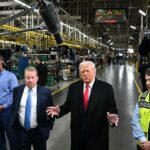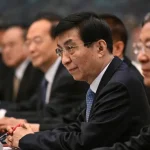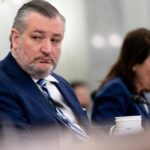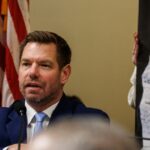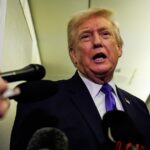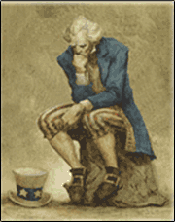
–>
September 28, 2022
“In the 1999 resolution regarding Taiwan’s future passed by the Democratic Progressive Party, it is stated very clearly that any change to the status quo of Taiwan must be decided by the people of Taiwan through referenda.” — Chen Shui-bian
‘); googletag.cmd.push(function () { googletag.display(‘div-gpt-ad-1609268089992-0’); }); }
“But no matter how people define ‘independence,’ at the heart of the matter is a desire to affirm the Taiwanese’s right to our identity for ourselves through the establishment, recognition and continued existence of a Taiwanese nation-state.” – A Taiwanese citizen
A meeting in New York last week between China’s foreign minister and Henry Kissinger is a good reminder that China’s territorial ambitions are at odds with its history. Every time it lets liberty creep in, its economy has improved; whenever it cracks down on liberty, the economy weakens. Even if China uses force to take Taiwan, it will be killing the goose that lays the golden eggs.
In 1949, after Mao Zedong’s communist forces won the war against the nationalists, Chiang Kai-shek, who had been President of the Republic of China (ROC) since 1928, went into exile in Taiwan. He led independent Taiwan from 1949 until his death in 1975.
‘); googletag.cmd.push(function () { googletag.display(‘div-gpt-ad-1609270365559-0’); }); }
Mao Zedong was chairman of the CCP from 1935 until he died in 1976, and was the leader of the People’s Republic of China (PRC) from 1949 to 1959. Under his repressive leadership, China suffered economically. His two most significant innovations, the Great Leap Forward and the Cultural Revolution, were ill-conceived and led to the Great Famine and the deaths of 45 million people. The top-down economy failed.
After Mao’s death, Deng Xiaoping gradually rose to supreme power and led China through far-reaching market-economy reforms, earning him the reputation as the “Architect of Modern China.” Under Deng’s still-communist regime (1976-1993), China accepted some ideas about individual freedom by absorbing external influence. This brought the World Trade Organization and foreign investments to China.
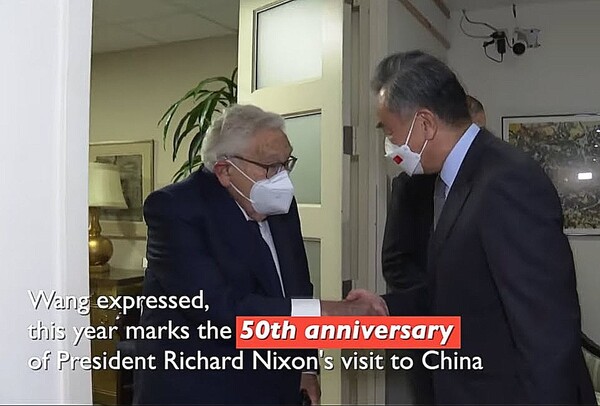
Image: Henry Kissinger meets with Wang Yi. YouTube Screen grab.
From 1993 to 2003, Jiang Zemin was communist China’s President. Influenced by the Soviet Union, he was determined to preserve the CCP’s monopoly on political power while he continued the commitment to free-market economic reforms.
Hu Jintao was President of the PRC from 2003 to 2012. Hu was conservative and gradually re-introduced total state control in the economic sector that Deng and Jiang had relaxed.
From 1980 to 2018, China’s GDP grew substantially, especially once its economy was fully open to trading with the West. Even as repression crept back in, the economy had such strength it seemed unstoppable.
To compare it with India, in 2017 the value of China’s exports of high-technology products was 43 times higher than India’s. Historical GDP of China also reported, “China’s nominal GDP surpassed that of Italy in 2000, France in 2005, the United Kingdom in 2006, Germany in 2007, Japan in 2010 and that of the Eurozone in 2018.” During this period of economic growth, China left Taiwan alone.
‘); googletag.cmd.push(function () { googletag.display(‘div-gpt-ad-1609268078422-0’); }); } if (publir_show_ads) { document.write(“
Xi Jinping succeeded Hu Jintao in late 2012. Over the last ten years, Xi has increased his political power and made China more isolated. With full economic control, Xi has cracked down on technology, real estate, and other industries to rein in what he sees as Western-style capitalism’s excesses. To reduce inequality, he’s returned to Mao’s socialist vision to empower the disadvantaged at the expense of economic growth.
The CCP began monitoring the American and British presence in the Indo-Pacific region in 2018, when it began competing for military power. At the same time, the West finally realized that China had been taking unfair advantage of Western technologies to power its vast economic growth. As a result, President Trump was the first state leader to decouple America from China. Other countries followed.
In the Economist‘s article, “How Xi Jinping is damaging China’s economy,” the author describes Xi’s inflexible policies and the consequences. The IMF has downgraded China’s growth forecast to 3.3 per cent in 2022, the lowest level in more than 40 years, and to 4.6 per cent in 2023, the report said. According to Reuters, China’s debt has risen sharply in the past decade. With the total debt of more than 250% of GDP, China’s corporate and household debt is where most worries are focused.
Meanwhile, Taiwan has become an economic power in the region. GDP per capita of Taiwan is currently at $34,284. China’s GDP per capita is currently at $13,000. To compensate for its economic woes, China is seemingly determined to acquire Taiwan’s wealth and advanced technologies.
Taipei Times reported in 2017 that Beijing had sent 5,000 spies to Taiwan to steal industrial secrets and policy information. China has also built artificial islands and illegally claimed fishing rights and economic interests of the neighboring countries. China has violated international territorial protocols and broken many maritime rules, causing severe harm to the coral reef environment. Maritime security in Southeast Asia has become a serious concern and this was raised by the ASEAN in April this year.
Since diplomatic talks with Taiwan have failed, China has increased its military aggression in the Taiwan Strait. These acts, once viewed as power plays, can also signal desperation. China’s determination to bring Taiwan under its economic control has become more apparent.
China disingenuously blames its aggression on Nancy Pelosi’s visit to Taiwan. Before Pelosi’s trip, Chinese foreign minister, Wang Yi, had stated, “If the U.S. side insists on visiting Taiwan, China will respond firmly, and the U.S. side must bear all the consequences.” After her visit, China heightened the cross-strait tension with increased drone incursions and massive military drills near the Kinmen islands in a show of force. Taiwan’s President Tsai Ing-wen labeled China’s zone mission as a type of ‘grey zone’ warfare.
Wang Yi has also criticized the Senate Foreign Relations Committee’s approval of the Taiwan Policy Act 2022. This significantly increases support for Taiwan’s defenses to ensure regional security.
Last week, Wang Yi rattled China’s sabre a bit more. According to Hong Kong O1, while he was in New York on official business, Wang Yi congratulated Henry Kissinger on his 100th birthday, which coincides with the 50th anniversary of diplomatic relations between America and the CCP.
Wang used this opportunity to discuss Taiwan, claiming that the Americans undermine the Three Joint Communiqué agreements (1972, 1979, 1982). He further warned that, if the United States does not return to the original meaning of the One China policy, the CCP will not hesitate to use force to unify Taiwan.
Kissinger, whose Détente policy eased tensions between the U.S. and Russia and who opened diplomatic channels between the U.S. and China in 1971, hinted that China had alternatives other than force. While recalling the history of the Shanghai Communiqué with the Chinese leaders in 1972, Kissinger agreed with Wang Yi that the extreme importance of the Taiwan question to China “should be fully understood.” However, Kissinger added that the U.S. and China need “dialogue rather than confrontation” and “should build a bilateral relationship of peaceful coexistence.” He hinted that the CCP has skipped dialogue in favor of threatening force.
Ultimately, though, Kissinger has no answer for Xi’s ambition. China wants to acquire Taiwan’s economy while imposing its autocratic rule over that free country. But economic success and individual liberty go together, while autocracy always reduces public trust and damages an economy.
<!– if(page_width_onload <= 479) { document.write("
“); googletag.cmd.push(function() { googletag.display(‘div-gpt-ad-1345489840937-4’); }); } –> If you experience technical problems, please write to [email protected]
FOLLOW US ON
<!–
–>
<!– _qoptions={ qacct:”p-9bKF-NgTuSFM6″ }; ![]() –> <!—-> <!– var addthis_share = { email_template: “new_template” } –>
–> <!—-> <!– var addthis_share = { email_template: “new_template” } –>


